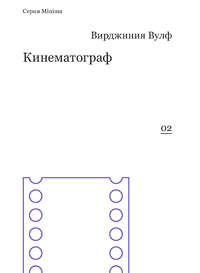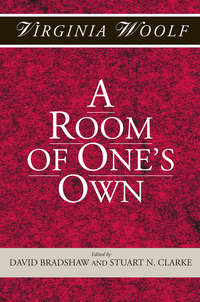 полная версия
полная версияNight and Day
Mrs. Hilbery had risen from her table, and was standing looking out of the window at a string of barges swimming up the river.
Katharine watched her. Suddenly Mrs. Hilbery turned abruptly, and exclaimed:
“I really believe I’m bewitched! I only want three sentences, you see, something quite straightforward and commonplace, and I can’t find ‘em.”
She began to pace up and down the room, snatching up her duster; but she was too much annoyed to find any relief, as yet, in polishing the backs of books.
“Besides,” she said, giving the sheet she had written to Katharine, “I don’t believe this’ll do. Did your grandfather ever visit the Hebrides, Katharine?” She looked in a strangely beseeching way at her daughter. “My mind got running on the Hebrides, and I couldn’t help writing a little description of them. Perhaps it would do at the beginning of a chapter. Chapters often begin quite differently from the way they go on, you know.” Katharine read what her mother had written. She might have been a schoolmaster criticizing a child’s essay. Her face gave Mrs. Hilbery, who watched it anxiously, no ground for hope.
“It’s very beautiful,” she stated, “but, you see, mother, we ought to go from point to point – ”
“Oh, I know,” Mrs. Hilbery exclaimed. “And that’s just what I can’t do. Things keep coming into my head. It isn’t that I don’t know everything and feel everything (who did know him, if I didn’t?), but I can’t put it down, you see. There’s a kind of blind spot,” she said, touching her forehead, “there. And when I can’t sleep o’ nights, I fancy I shall die without having done it.”
From exultation she had passed to the depths of depression which the imagination of her death aroused. The depression communicated itself to Katharine. How impotent they were, fiddling about all day long with papers! And the clock was striking eleven and nothing done! She watched her mother, now rummaging in a great brass-bound box which stood by her table, but she did not go to her help. Of course, Katharine reflected, her mother had now lost some paper, and they would waste the rest of the morning looking for it. She cast her eyes down in irritation, and read again her mother’s musical sentences about the silver gulls, and the roots of little pink flowers washed by pellucid streams, and the blue mists of hyacinths, until she was struck by her mother’s silence. She raised her eyes. Mrs. Hilbery had emptied a portfolio containing old photographs over her table, and was looking from one to another.
“Surely, Katharine,” she said, “the men were far handsomer in those days than they are now, in spite of their odious whiskers? Look at old John Graham, in his white waistcoat – look at Uncle Harley. That’s Peter the manservant, I suppose. Uncle John brought him back from India.”
Katharine looked at her mother, but did not stir or answer. She had suddenly become very angry, with a rage which their relationship made silent, and therefore doubly powerful and critical. She felt all the unfairness of the claim which her mother tacitly made to her time and sympathy, and what Mrs. Hilbery took, Katharine thought bitterly, she wasted. Then, in a flash, she remembered that she had still to tell her about Cyril’s misbehavior. Her anger immediately dissipated itself; it broke like some wave that has gathered itself high above the rest; the waters were resumed into the sea again, and Katharine felt once more full of peace and solicitude, and anxious only that her mother should be protected from pain. She crossed the room instinctively, and sat on the arm of her mother’s chair. Mrs. Hilbery leant her head against her daughter’s body.
“What is nobler,” she mused, turning over the photographs, “than to be a woman to whom every one turns, in sorrow or difficulty? How have the young women of your generation improved upon that, Katharine? I can see them now, sweeping over the lawns at Melbury House, in their flounces and furbelows, so calm and stately and imperial (and the monkey and the little black dwarf following behind), as if nothing mattered in the world but to be beautiful and kind. But they did more than we do, I sometimes think. They WERE, and that’s better than doing. They seem to me like ships, like majestic ships, holding on their way, not shoving or pushing, not fretted by little things, as we are, but taking their way, like ships with white sails.”
Katharine tried to interrupt this discourse, but the opportunity did not come, and she could not forbear to turn over the pages of the album in which the old photographs were stored. The faces of these men and women shone forth wonderfully after the hubbub of living faces, and seemed, as her mother had said, to wear a marvelous dignity and calm, as if they had ruled their kingdoms justly and deserved great love. Some were of almost incredible beauty, others were ugly enough in a forcible way, but none were dull or bored or insignificant. The superb stiff folds of the crinolines suited the women; the cloaks and hats of the gentlemen seemed full of character. Once more Katharine felt the serene air all round her, and seemed far off to hear the solemn beating of the sea upon the shore. But she knew that she must join the present on to this past.
Mrs. Hilbery was rambling on, from story to story.
“That’s Janie Mannering,” she said, pointing to a superb, white-haired dame, whose satin robes seemed strung with pearls. “I must have told you how she found her cook drunk under the kitchen table when the Empress was coming to dinner, and tucked up her velvet sleeves (she always dressed like an Empress herself), cooked the whole meal, and appeared in the drawing-room as if she’d been sleeping on a bank of roses all day. She could do anything with her hands – they all could – make a cottage or embroider a petticoat.
“And that’s Queenie Colquhoun,” she went on, turning the pages, “who took her coffin out with her to Jamaica, packed with lovely shawls and bonnets, because you couldn’t get coffins in Jamaica, and she had a horror of dying there (as she did), and being devoured by the white ants. And there’s Sabine, the loveliest of them all; ah! it was like a star rising when she came into the room. And that’s Miriam, in her coachman’s cloak, with all the little capes on, and she wore great top-boots underneath. You young people may say you’re unconventional, but you’re nothing compared with her.”
Turning the page, she came upon the picture of a very masculine, handsome lady, whose head the photographer had adorned with an imperial crown.
“Ah, you wretch!” Mrs. Hilbery exclaimed, “what a wicked old despot you were, in your day! How we all bowed down before you! ‘Maggie,’ she used to say, ‘if it hadn’t been for me, where would you be now?’ And it was true; she brought them together, you know. She said to my father, ‘Marry her,’ and he did; and she said to poor little Clara, ‘Fall down and worship him,’ and she did; but she got up again, of course. What else could one expect? She was a mere child – eighteen – and half dead with fright, too. But that old tyrant never repented. She used to say that she had given them three perfect months, and no one had a right to more; and I sometimes think, Katharine, that’s true, you know. It’s more than most of us have, only we have to pretend, which was a thing neither of them could ever do. I fancy,” Mrs. Hilbery mused, “that there was a kind of sincerity in those days between men and women which, with all your outspokenness, you haven’t got.”
Katharine again tried to interrupt. But Mrs. Hilbery had been gathering impetus from her recollections, and was now in high spirits.
“They must have been good friends at heart,” she resumed, “because she used to sing his songs. Ah, how did it go?” and Mrs. Hilbery, who had a very sweet voice, trolled out a famous lyric of her father’s which had been set to an absurdly and charmingly sentimental air by some early Victorian composer.
“It’s the vitality of them!” she concluded, striking her fist against the table. “That’s what we haven’t got! We’re virtuous, we’re earnest, we go to meetings, we pay the poor their wages, but we don’t live as they lived. As often as not, my father wasn’t in bed three nights out of the seven, but always fresh as paint in the morning. I hear him now, come singing up the stairs to the nursery, and tossing the loaf for breakfast on his sword-stick, and then off we went for a day’s pleasuring – Richmond, Hampton Court, the Surrey Hills. Why shouldn’t we go, Katharine? It’s going to be a fine day.”
At this moment, just as Mrs. Hilbery was examining the weather from the window, there was a knock at the door. A slight, elderly lady came in, and was saluted by Katharine, with very evident dismay, as “Aunt Celia!” She was dismayed because she guessed why Aunt Celia had come. It was certainly in order to discuss the case of Cyril and the woman who was not his wife, and owing to her procrastination Mrs. Hilbery was quite unprepared. Who could be more unprepared? Here she was, suggesting that all three of them should go on a jaunt to Blackfriars to inspect the site of Shakespeare’s theater, for the weather was hardly settled enough for the country.
To this proposal Mrs. Milvain listened with a patient smile, which indicated that for many years she had accepted such eccentricities in her sister-in-law with bland philosophy. Katharine took up her position at some distance, standing with her foot on the fender, as though by so doing she could get a better view of the matter. But, in spite of her aunt’s presence, how unreal the whole question of Cyril and his morality appeared! The difficulty, it now seemed, was not to break the news gently to Mrs. Hilbery, but to make her understand it. How was one to lasso her mind, and tether it to this minute, unimportant spot? A matter-of-fact statement seemed best.
“I think Aunt Celia has come to talk about Cyril, mother,” she said rather brutally. “Aunt Celia has discovered that Cyril is married. He has a wife and children.”
“No, he is NOT married,” Mrs. Milvain interposed, in low tones, addressing herself to Mrs. Hilbery. “He has two children, and another on the way.”
Mrs. Hilbery looked from one to the other in bewilderment.
“We thought it better to wait until it was proved before we told you,” Katharine added.
“But I met Cyril only a fortnight ago at the National Gallery!” Mrs. Hilbery exclaimed. “I don’t believe a word of it,” and she tossed her head with a smile on her lips at Mrs. Milvain, as though she could quite understand her mistake, which was a very natural mistake, in the case of a childless woman, whose husband was something very dull in the Board of Trade.
“I didn’t WISH to believe it, Maggie,” said Mrs. Milvain. “For a long time I COULDN’T believe it. But now I’ve seen, and I HAVE to believe it.”
“Katharine,” Mrs. Hilbery demanded, “does your father know of this?”
Katharine nodded.
“Cyril married!” Mrs. Hilbery repeated. “And never telling us a word, though we’ve had him in our house since he was a child – noble William’s son! I can’t believe my ears!”
Feeling that the burden of proof was laid upon her, Mrs. Milvain now proceeded with her story. She was elderly and fragile, but her childlessness seemed always to impose these painful duties on her, and to revere the family, and to keep it in repair, had now become the chief object of her life. She told her story in a low, spasmodic, and somewhat broken voice.
“I have suspected for some time that he was not happy. There were new lines on his face. So I went to his rooms, when I knew he was engaged at the poor men’s college. He lectures there – Roman law, you know, or it may be Greek. The landlady said Mr. Alardyce only slept there about once a fortnight now. He looked so ill, she said. She had seen him with a young person. I suspected something directly. I went to his room, and there was an envelope on the mantelpiece, and a letter with an address in Seton Street, off the Kennington Road.”
Mrs. Hilbery fidgeted rather restlessly, and hummed fragments of her tune, as if to interrupt.
“I went to Seton Street,” Aunt Celia continued firmly. “A very low place – lodging-houses, you know, with canaries in the window. Number seven just like all the others. I rang, I knocked; no one came. I went down the area. I am certain I saw some one inside – children – a cradle. But no reply – no reply.” She sighed, and looked straight in front of her with a glazed expression in her half-veiled blue eyes.
“I stood in the street,” she resumed, “in case I could catch a sight of one of them. It seemed a very long time. There were rough men singing in the public-house round the corner. At last the door opened, and some one – it must have been the woman herself – came right past me. There was only the pillar-box between us.”
“And what did she look like?” Mrs. Hilbery demanded.
“One could see how the poor boy had been deluded,” was all that Mrs. Milvain vouchsafed by way of description.
“Poor thing!” Mrs. Hilbery exclaimed.
“Poor Cyril!” Mrs. Milvain said, laying a slight emphasis upon Cyril.
“But they’ve got nothing to live upon,” Mrs. Hilbery continued. “If he’d come to us like a man,” she went on, “and said, ‘I’ve been a fool,’ one would have pitied him; one would have tried to help him. There’s nothing so disgraceful after all – But he’s been going about all these years, pretending, letting one take it for granted, that he was single. And the poor deserted little wife – ”
“She is NOT his wife,” Aunt Celia interrupted.
“I’ve never heard anything so detestable!” Mrs. Hilbery wound up, striking her fist on the arm of her chair. As she realized the facts she became thoroughly disgusted, although, perhaps, she was more hurt by the concealment of the sin than by the sin itself. She looked splendidly roused and indignant; and Katharine felt an immense relief and pride in her mother. It was plain that her indignation was very genuine, and that her mind was as perfectly focused upon the facts as any one could wish – more so, by a long way, than Aunt Celia’s mind, which seemed to be timidly circling, with a morbid pleasure, in these unpleasant shades. She and her mother together would take the situation in hand, visit Cyril, and see the whole thing through.
“We must realize Cyril’s point of view first,” she said, speaking directly to her mother, as if to a contemporary, but before the words were out of her mouth, there was more confusion outside, and Cousin Caroline, Mrs. Hilbery’s maiden cousin, entered the room. Although she was by birth an Alardyce, and Aunt Celia a Hilbery, the complexities of the family relationship were such that each was at once first and second cousin to the other, and thus aunt and cousin to the culprit Cyril, so that his misbehavior was almost as much Cousin Caroline’s affair as Aunt Celia’s. Cousin Caroline was a lady of very imposing height and circumference, but in spite of her size and her handsome trappings, there was something exposed and unsheltered in her expression, as if for many summers her thin red skin and hooked nose and reduplication of chins, so much resembling the profile of a cockatoo, had been bared to the weather; she was, indeed, a single lady; but she had, it was the habit to say, “made a life for herself,” and was thus entitled to be heard with respect.
“This unhappy business,” she began, out of breath as she was. “If the train had not gone out of the station just as I arrived, I should have been with you before. Celia has doubtless told you. You will agree with me, Maggie. He must be made to marry her at once for the sake of the children – ”
“But does he refuse to marry her?” Mrs. Hilbery inquired, with a return of her bewilderment.
“He has written an absurd perverted letter, all quotations,” Cousin Caroline puffed. “He thinks he’s doing a very fine thing, where we only see the folly of it… The girl’s every bit as infatuated as he is – for which I blame him.”
“She entangled him,” Aunt Celia intervened, with a very curious smoothness of intonation, which seemed to convey a vision of threads weaving and interweaving a close, white mesh round their victim.
“It’s no use going into the rights and wrongs of the affair now, Celia,” said Cousin Caroline with some acerbity, for she believed herself the only practical one of the family, and regretted that, owing to the slowness of the kitchen clock, Mrs. Milvain had already confused poor dear Maggie with her own incomplete version of the facts. “The mischief’s done, and very ugly mischief too. Are we to allow the third child to be born out of wedlock? (I am sorry to have to say these things before you, Katharine.) He will bear your name, Maggie – your father’s name, remember.”
“But let us hope it will be a girl,” said Mrs. Hilbery.
Katharine, who had been looking at her mother constantly, while the chatter of tongues held sway, perceived that the look of straightforward indignation had already vanished; her mother was evidently casting about in her mind for some method of escape, or bright spot, or sudden illumination which should show to the satisfaction of everybody that all had happened, miraculously but incontestably, for the best.
“It’s detestable – quite detestable!” she repeated, but in tones of no great assurance; and then her face lit up with a smile which, tentative at first, soon became almost assured. “Nowadays, people don’t think so badly of these things as they used to do,” she began. “It will be horribly uncomfortable for them sometimes, but if they are brave, clever children, as they will be, I dare say it’ll make remarkable people of them in the end. Robert Browning used to say that every great man has Jewish blood in him, and we must try to look at it in that light. And, after all, Cyril has acted on principle. One may disagree with his principle, but, at least, one can respect it – like the French Revolution, or Cromwell cutting the King’s head off. Some of the most terrible things in history have been done on principle,” she concluded.
“I’m afraid I take a very different view of principle,” Cousin Caroline remarked tartly.
“Principle!” Aunt Celia repeated, with an air of deprecating such a word in such a connection. “I will go to-morrow and see him,” she added.
“But why should you take these disagreeable things upon yourself, Celia?” Mrs. Hilbery interposed, and Cousin Caroline thereupon protested with some further plan involving sacrifice of herself.
Growing weary of it all, Katharine turned to the window, and stood among the folds of the curtain, pressing close to the window-pane, and gazing disconsolately at the river much in the attitude of a child depressed by the meaningless talk of its elders. She was much disappointed in her mother – and in herself too. The little tug which she gave to the blind, letting it fly up to the top with a snap, signified her annoyance. She was very angry, and yet impotent to give expression to her anger, or know with whom she was angry. How they talked and moralized and made up stories to suit their own version of the becoming, and secretly praised their own devotion and tact! No; they had their dwelling in a mist, she decided; hundreds of miles away – away from what? “Perhaps it would be better if I married William,” she thought suddenly, and the thought appeared to loom through the mist like solid ground. She stood there, thinking of her own destiny, and the elder ladies talked on, until they had talked themselves into a decision to ask the young woman to luncheon, and tell her, very friendlily, how such behavior appeared to women like themselves, who knew the world. And then Mrs. Hilbery was struck by a better idea.
CHAPTER X
Messrs. Grateley and Hooper, the solicitors in whose firm Ralph Denham was clerk, had their office in Lincoln’s Inn Fields, and there Ralph Denham appeared every morning very punctually at ten o’clock. His punctuality, together with other qualities, marked him out among the clerks for success, and indeed it would have been safe to wager that in ten years’ time or so one would find him at the head of his profession, had it not been for a peculiarity which sometimes seemed to make everything about him uncertain and perilous. His sister Joan had already been disturbed by his love of gambling with his savings. Scrutinizing him constantly with the eye of affection, she had become aware of a curious perversity in his temperament which caused her much anxiety, and would have caused her still more if she had not recognized the germs of it in her own nature. She could fancy Ralph suddenly sacrificing his entire career for some fantastic imagination; some cause or idea or even (so her fancy ran) for some woman seen from a railway train, hanging up clothes in a back yard. When he had found this beauty or this cause, no force, she knew, would avail to restrain him from pursuit of it. She suspected the East also, and always fidgeted herself when she saw him with a book of Indian travels in his hand, as though he were sucking contagion from the page. On the other hand, no common love affair, had there been such a thing, would have caused her a moment’s uneasiness where Ralph was concerned. He was destined in her fancy for something splendid in the way of success or failure, she knew not which.
And yet nobody could have worked harder or done better in all the recognized stages of a young man’s life than Ralph had done, and Joan had to gather materials for her fears from trifles in her brother’s behavior which would have escaped any other eye. It was natural that she should be anxious. Life had been so arduous for all of them from the start that she could not help dreading any sudden relaxation of his grasp upon what he held, though, as she knew from inspection of her own life, such sudden impulse to let go and make away from the discipline and the drudgery was sometimes almost irresistible. But with Ralph, if he broke away, she knew that it would be only to put himself under harsher constraint; she figured him toiling through sandy deserts under a tropical sun to find the source of some river or the haunt of some fly; she figured him living by the labor of his hands in some city slum, the victim of one of those terrible theories of right and wrong which were current at the time; she figured him prisoner for life in the house of a woman who had seduced him by her misfortunes. Half proudly, and wholly anxiously, she framed such thoughts, as they sat, late at night, talking together over the gas-stove in Ralph’s bedroom.
It is likely that Ralph would not have recognized his own dream of a future in the forecasts which disturbed his sister’s peace of mind. Certainly, if any one of them had been put before him he would have rejected it with a laugh, as the sort of life that held no attractions for him. He could not have said how it was that he had put these absurd notions into his sister’s head. Indeed, he prided himself upon being well broken into a life of hard work, about which he had no sort of illusions. His vision of his own future, unlike many such forecasts, could have been made public at any moment without a blush; he attributed to himself a strong brain, and conferred on himself a seat in the House of Commons at the age of fifty, a moderate fortune, and, with luck, an unimportant office in a Liberal Government. There was nothing extravagant in a forecast of that kind, and certainly nothing dishonorable. Nevertheless, as his sister guessed, it needed all Ralph’s strength of will, together with the pressure of circumstances, to keep his feet moving in the path which led that way. It needed, in particular, a constant repetition of a phrase to the effect that he shared the common fate, found it best of all, and wished for no other; and by repeating such phrases he acquired punctuality and habits of work, and could very plausibly demonstrate that to be a clerk in a solicitor’s office was the best of all possible lives, and that other ambitions were vain.
But, like all beliefs not genuinely held, this one depended very much upon the amount of acceptance it received from other people, and in private, when the pressure of public opinion was removed, Ralph let himself swing very rapidly away from his actual circumstances upon strange voyages which, indeed, he would have been ashamed to describe. In these dreams, of course, he figured in noble and romantic parts, but self-glorification was not the only motive of them. They gave outlet to some spirit which found no work to do in real life, for, with the pessimism which his lot forced upon him, Ralph had made up his mind that there was no use for what, contemptuously enough, he called dreams, in the world which we inhabit. It sometimes seemed to him that this spirit was the most valuable possession he had; he thought that by means of it he could set flowering waste tracts of the earth, cure many ills, or raise up beauty where none now existed; it was, too, a fierce and potent spirit which would devour the dusty books and parchments on the office wall with one lick of its tongue, and leave him in a minute standing in nakedness, if he gave way to it. His endeavor, for many years, had been to control the spirit, and at the age of twenty-nine he thought he could pride himself upon a life rigidly divided into the hours of work and those of dreams; the two lived side by side without harming each other. As a matter of fact, this effort at discipline had been helped by the interests of a difficult profession, but the old conclusion to which Ralph had come when he left college still held sway in his mind, and tinged his views with the melancholy belief that life for most people compels the exercise of the lower gifts and wastes the precious ones, until it forces us to agree that there is little virtue, as well as little profit, in what once seemed to us the noblest part of our inheritance.









